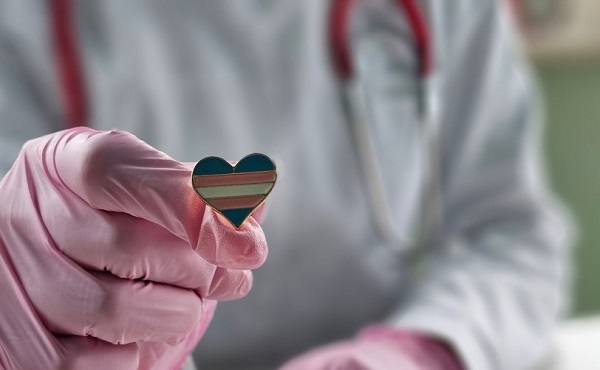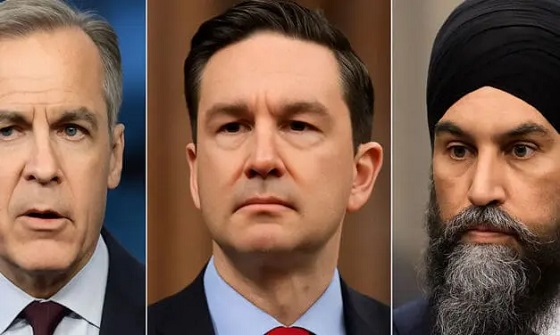Health
Private Footage Reveals Leading Medical Org’s Efforts To ‘Normalize’ Gender Ideology

 From the Daily Caller News Foundation
From the Daily Caller News Foundation
By MEGAN BROCK AND KATE ANDERSON
I have developed a part of my brain that’s very fluid around with some of my folks asking them each week, what name are you going by? What pronouns are we using today? So it keeps us flexible to be doing this work.
This is the seventh article in the “WPATH Tapes” series on the World Professional Association for Transgender Health and the gender medical industry. Read the overview of our investigation here.
Members of the world’s most prominent transgender medical organization encouraged fellow doctors to push transgender ideology beyond the healthcare field into schools and their communities, according to internal recordings obtained by the Daily Caller News Foundation.
In September 2022, the World Professional Association of Transgender Health (WPATH) Global Education Institute (GEI) hosted an event that included a series of education sessions for certification in transgender medicine. The event coincided with the release of WPATH’s updated medical guidance, called the Standards of Care Version 8 (SOC 8), and provided additional insights on its clinical applications.
During the sessions WPATH members were encouraged to “normalize” preferred pronoun use as a way to “create societal change” and behave in a way that “affirms” their patients’ gender identity, such as by asking female patients if they have a penis.
Psychologist Ren Massey, the co-chair of WPATH GEI, said clinicians should be ready to act as advocates for “gender diversity” in school settings. Massey earned a Ph.D. in clinical psychology from University of South Florida and is not a physician.
“We want to have the skills to negotiate multiple roles,” Massey said. “Because I have both had to be the therapist and then go talk to the school and be an advocate, or do a talk to the whole community of a school. So, I’m in multiple hats that we get to navigate, if we are advocating and helping and supporting our trans and gender diverse folks we are working with.”
Massey did not respond to requests for comment, and neither did Massey’s psychology practice.
Transgender ideology includes the belief that a person’s sex can be different from their “gender identity,” which SOC 8 defines as “a person’s deeply felt, internal, intrinsic sense of their own gender.” It’s a rejection of long-established scientific understanding of biology that there are only two sexes based on the fact there are only two types of reproductive cells — sperm and ova.
The term “gender identity” was popularized in the 1960s by controversial sexologist John Money, who’s most high-profile experiment involved advising parents of a boy whose penis was damaged in a botched circumcision to cut the rest of it off and raise him as a girl. At age 15, the boy — who was raised as “Brenda” — discovered the truth and rejected further hormone treatments. He eventually committed suicide at age 38.
The very concept of “gender identity” creates the possibility of changing one’s sex — a biological impossibility — through medical interventions, therefore creating a demand for medical sex reassignment interventions.
SOC 8 recommends that gender dysphoric minors be given the opportunity to “change” their sex through medical interventions. The guidance has been used to inform government regulations, insurance policies, and recommendations by numerous medical organizations, increasing minors access to sex reassignment procedures.
‘We Will Facilitate Changes’
The call for clinicians to be involved in local schools was echoed by WPATH-affiliated psychologist Dr. Wallace Wong in a presentation titled “Foundations in Gender Affirming Mental Health Care in Childhood and Adolescence.” Wong explained how therapists can play a pivotal role in facilitating change by helping schools embrace transgenderism and explained that schools need to embrace the use of preferred pronouns.
“A lot of time we will facilitate changes. It’s not unusual that you will go to the school with the parents together and educate the school what to do,” said Wong. “A lot of the times, some school they say, ‘we don’t know what to do.’ You say, ‘that doesn’t fly, I will teach you how to do,’” Wong said.
Wong did not respond to requests for comment, and the Diversity and Emotional Wellness Centre, where Wong works, provided additional contact information but did not provide comment.
SOC 8 recommends that “health care professionals work with families, schools, and other relevant settings to promote acceptance of gender diverse expressions of behavior and identities of the adolescent.”
“Using different pronouns for children is a step towards their social transition. It is now well established that social transition leads to the medicalization of their care,” Dr. Stanley Goldfarb of Do No Harm, a watchdog organization focused on keeping identity politics out of healthcare and medical schools, told the DCNF.
“It is inappropriate for anyone to advocate gender transition in gender dysphoric children unless they have had extensive psychological counseling and are part of some formal research protocol,” Goldfarb said. “This is the new policy in the United Kingdom and in multiple European countries.”
Without naming a specific doctor, Goldfarb said that “for a physician to speak to untrained personnel given the psychological difficulties that these children often experience along with their gender dysphoria, is bordering on malpractice.”
‘The Face Of The Enemy’
As European nations such as Norway, Sweden, Denmark, and the U.K. have restricted or halted the use of cross-sex hormones and puberty blockers in minors, WPATH has rallied against similar bans in the United States.
The WPATH GEI educational event dedicated an entire session to transgender legal and policy issues. Paula Neira, a biological man who identifies as a woman and is program director of LGBTQ Equity & Education at Johns Hopkins Medicine, gave a presentation titled “Legal Issues & Policy.” During the talk, Neira criticized legislative efforts aimed at stopping child sex changes and protecting women’s sports.
“Numerous states have either engaged in having litigation and legislation proposed or the government has taken actions that are targeting the LGBTQ+ community broadly, and then at least half of these bills are specifically targeting transgender people, particularly transgender youth. The way that these bills are being played out is, one is attempts to ban gender affirming care,” Neira said.
“In Alabama they’re trying to criminalize, by making it a felony, to provide gender-affirming care to transgender youth. The bill is called the “Alabama Child Compassion and Protection Act” so the height of cynicism and hypocrisy,” Neira said.
Neira ended the session by calling on WPATH members to band together and stand firm against “attacks” on the transgender community.
“Being defiant in the face of the enemy is not something that’s unfamiliar to me,” Neria said. “It’s going to take a lot of resolve. It’s going take a lot of resilience. It’s going take a lot of mutual support, to stand firm under these attacks. And that’s what we have to do. And we have to do it with a clear strategic eye. And that means banding together. It means being strategic in how we challenge policy, how we advocate and make persuasive arguments.”
“And together we’re gonna get back to making progress no matter how bleak it looks now, as long as we never give in. And we never surrender,” Neira told the audience, prompting applause.
Neira did not respond to requests for comment. Johns Hopkins Medicine, where Neira works, responded but did not provide comment.
‘Helps All Humans’
Throughout the 30 hours of WPATH GEI recordings reviewed by the DCNF, speakers cast a vision of moving gender ideology beyond sex change procedures and promoting it in other domains such as schools, communities and public policy.
Dr. Scott Leibowitz, a WPATH board member and SOC 8 co-author, said it “helps all humans” to promote the acceptance of transgender ideology in a diversity of settings.
“We recommend health care professionals who work with families. They should work with families, schools, and other relevant settings to promote acceptance of gender diverse expressions of behavior and identities of the adolescent,” Leibowitz said.
“Notice, we don’t say: ‘work with these settings to promote acceptance of transgender people,’” Leibowitz told the audience. “We actually think it’s broader than that because by helping promote acceptance of gender diversity as a whole, we believe that helps all humans, including trans people. It doesn’t reinforce the notion of boxes, which is what we’re trying to move away from.”
Leibowitz declined an interview request through a Nationwide Children’s Hospitals spokesperson.
WPATH’s commitment to social change is captured in its own guidelines.
“WPATH recognizes that health is not only dependent upon high-quality clinical care but also relies on social and political climates that ensure social tolerance, equality, and the full rights of citizenship,” the guidelines read. “Health is promoted through public policies and legal reforms that advance tolerance and equity for gender diversity and that eliminate prejudice, discrimination, and stigma. WPATH is committed to advocacy for these policy and legal changes.”
‘Creating Change By Using Different Language’
WPATH members were also encouraged to use preferred pronouns in healthcare practices, with Massey describing the use of preferred pronouns as a way to create social change.
“I would encourage you in your practices to have universal approaches to correct pronouns. So, training your staff so they’re aware and have good interaction skills. Maybe even have role plays with them,” Massey said.
“We are creating change by using different language,” said Massey.
Massey, who maintains an active psychology practice, said it’s “good clinical practice” to let clients dictate terminology used to describe their sex and gender.
“I’ve had folks that within the same day or within the same week may shift from feeling masculine, feminine, both, neither,” Massey said.
“And so that’s a thing like I have developed a part of my brain that’s very fluid around with some of my folks asking them each week, what name are you going by? What pronouns are we using today? So it keeps us flexible to be doing this work. There is so much evolution and so much exciting work developing.”
SOC 8 recommends that healthcare professionals use the “language or terminology” preferred by the patient.
‘Normalize It’
Dr. Jennifer Slovis, the medical director of the Oakland Kaiser Permanente Gender Clinic, promoted the use of an electronic medical database that collects sexual orientation and gender identity information for all patients. On the form, healthcare providers were expected to indicate a patient’s preferred pronouns and gender identity, as well as take an “organ inventory” for the patient.
The organ inventory asks both men and women to indicate their reproductive organs on a list that includes the cervix, breasts, uterus, vagina, testes, prostate and penis. Clinicians were also asked to indicate which organs were present at birth, had been surgically constructed, or developed by hormones.
Slovis explained that to “normalize” the organ inventory, this data needs to be collected for all patients, including “cisgender” patients.
“Cisgender people too, we should be doing this for everybody. That’s the only way we’re going to normalize it, if we do it for everybody,” said Slovis.
Slovis did not respond to requests for comment, and neither did Kaiser Permanente, where Slovis works.
In a presentation titled “Foundations in Primary Care,” Dr. Erika Sullivan said organ inventories needed to be constantly taken because patients’ organs “change.”
“One of the things I always like to illustrate with this is that you don’t just ask this question once, right? Because this changes. And so sexual practices change, pronouns change, organs change,” said Sullivan.
“You kind of have to constantly take that inventory to find out like, what’s what, what’s where, what are we doing?” Sullivan said.
WPATH’s SOC 8 supports the use of organ inventories.
“In electronic health records, organ/anatomical inventories can be standardly used to inform appropriate clinical care, rather than relying solely on assigned sex at birth and/ or gender identity designations,” the guidelines read.
Sullivan also explained the importance of using preferred pronouns and not assuming a patient’s pronouns based on outward appearance.
“I should be asking this of everybody and introducing myself this way, ‘Hi, I’m Erica, I use she/her pronouns,’” Sullivan said. “Because I think if we are going by sort of presentation, we are taking so much bias and so much judgment into that space. It’s really important to just wipe that away. So asking everyone’s pronouns is important because really, ultimately, you have to question your assumptions.”
Sullivan did not respond to requests for comment, and neither did the University of Utah, where Sullivan works.
Goldfarb said doctors should focus on patient care, not promoting gender ideology.
“It is not the job of physicians to create a culture of gender ideology. The job of physicians is to care for ill people,” Goldfarb said. “The proper care for children with gender dysphoria is intensive psychological treatment. The idea that all this should be normalized represents pure ideology and is not based on hard science or valid clinical research.”
WPATH did not respond to multiple requests for comment.
Mental Health
Headline that reads ‘Ontario must pay for surgery to give trans resident both penis and vagina: appeal court’ a sign of the times in Canada

From LifeSiteNews
Gender ideology so entrenched, surgical mutilation is no longer considered fringe
If you’d like a glimpse of what 10 years of progressive rule has done to Canada in a single sentence, I submit to you this April 24 headline: “Ontario must pay for surgery to give trans resident both penis and vagina: appeal court.”
Imagine reading a headline like that in, say, 2010. You’d wonder what country you were living in — that is, if you weren’t trying to figure out what you just read. But in Canada in 2025, this stuff isn’t fringe. It’s establishment.
The Ontario Court of Appeal, the province’s top court, issued a ruling this week stating that the province must pay for a “penile-sparing vaginoplasty” for a resident who identifies as transgender but does not identify “exclusively” as either male or female and thus would like to possess both a penis and a vagina.
According to the Post, “a three-judge panel of the Ontario Court of Appeal confirmed a lower court’s ruling that the novel phallus-preserving surgery qualifies as an insured service under the Ontario Health Insurance Plan.” In case you’re tempted to write this off as an aberration at the hands of a handful of activist judges, this ruling is the third unanimous decision in favor of the “patient,” identified in court records as “K.S.”
“K.S. is pleased with the Court of Appeal’s decision, which is now the third unanimous ruling confirming that her gender affirming surgery is covered under Ontario’s Health Insurance Act and its regulation,” K.S.’s lawyer, John McIntyre, told the Post. K.S., as it turns out, identifies as neither male nor female … but uses female pronouns:
The legal battle between K.S., whose sex at birth was male, dates to 2022, when the Ontario Health Insurance Plan (OHIP) refused her request to pay for the cost of surgery at a Texas clinic to construct a vagina while sparing the penis, a procedure this is not available in Ontario, or anywhere else in Canada. K.S. uses female pronouns but does not identify as either fully female or fully male.
Previously, saner generations would have no idea how to interpret the preceding paragraph, but gender ideology has made fools of us all. OHIP attempted to argue that “because the vaginoplasty would not be accompanied by a penectomy, the procedure isn’t one specifically listed in OHIP’s Schedule of Benefits and therefore shouldn’t be publicly funded” and also that the surgery is “experimental” in Ontario and thus can’t be covered.
But K.S., who has a male member but would also like a neo-vagina, appealed to the Health Services Appeal and Review Board, which overturned OHIP’s decision. OHIP appealed to the Divisional Court but lost; the latest appeal, heard November 26, was also rejected because a “penectomy,” the removal of the penis, was “neither recommended by K.S.’s health professionals nor desired by K.S.,” according to the court’s decision.
I wonder if the judges thought that they’d be ruling on whether a man who identifies as neither a man or a woman was entitled to obtain a vagina while retaining his penis when they were going to law school.
The court stated that K.S., who is in his early 30s, “has experienced significant gender dysphoria since her teenage years, as well as physical, mental and economic hardships to transition her gender expression to align with her gender identity.” Of course, K.S. isn’t “transgender,” per se — because he doesn’t identify as the opposite sex, even though he uses the pronouns of the opposite sex. He wants to be … both, somehow. And he wants the taxpayer to pay for it.
As the Post reported:
K.S.’s doctor submitted a request to OHIP for prior funding approval for the surgical creation of a vaginal cavity and external vulva. The request made it clear that K.S. wasn’t seeking a penectomy. In a letter accompanying the request, her doctor said that because K.S. is “not completely on the ‘feminine’ end of the spectrum” it was important for her to have a vagina while maintaining her penis, adding that the Crane Center for Transgender Surgery in Austin, Tx.,” has an excellent reputation” for gender-affirming surgery, “and especially with these more complicated procedures.”
The surgeries, depending on which are performed, range in cost “from US $10,000 to $70,000.” The court also ordered Ontario to pay K.S. $23,250 after dismissing OHIP’s appeal; the province has until June 23 to seek leave to the Supreme Court of Canada.
Mental Health
Suspect who killed 11 in Vancouver festival attack ID’d

Quick Hit:
Authorities have identified the driver responsible for the devastating attack at Vancouver’s Lapu Lapu Day festival that killed at least 11 and injured dozens more. The suspect, Kai-Ji Adam Lo, 30, had a well-documented history of mental illness, and his family sought help just hours before the tragic event.
Key Details:
- Kai-Ji Adam Lo, 30, was identified as the driver who plowed into a crowd, killing 11 and injuring dozens more.
- Lo’s family sought psychiatric help for him hours before the attack; he was already known to law enforcement.
- Police believe the attack was not terror-related, citing Lo’s extensive mental health struggles.
At least 9 dead in mass casualty event after driver crashes into crowd at Vancouver street festival.
The 30 year old driver was taken into custody by festival goers then arrested.
According to law enforcement “the suspect was known to police for certain circumstances”. pic.twitter.com/slG7LsZNFG
— Kevin Dalton (@TheKevinDalton) April 27, 2025
Diving Deeper:
The city of Vancouver is grappling with unspeakable tragedy following the deadly assault that unfolded during the Lapu Lapu Day festival, a vibrant celebration honoring the Filipino community. Authorities have identified the man behind the wheel as 30-year-old Kai-Ji Adam Lo, who was apprehended at the scene Saturday night.
Lo, whose troubled history with mental illness was well known to local authorities and mental health professionals, faces eight counts of second-degree murder, with additional charges expected as the investigation continues. According to reports, Lo’s family had reached out to a hospital psychiatric ward just hours before the incident, desperately seeking help for him amid his escalating paranoia and delusions. It remains unclear whether any intervention was made in response to the family’s call.
Vancouver Police Chief Steve Rai confirmed that Lo had no interactions with law enforcement immediately prior to the event, but acknowledged that the city is reeling from its “darkest day.” Investigators emphasized that, because of Lo’s mental state, they do not believe the attack was terror-related.
Adding to the complex portrait of the suspect, Lo was mourning profound personal loss. His brother, Alexander Lo, was murdered in January 2024. Following the death, Lo had penned heartbreaking posts online, sharing how his brother’s death and his mother’s subsequent suicide attempt shattered their family.
Tragically, among the 11 killed during Saturday’s carnage was a 5-year-old child. Dozens more were wounded when Lo drove his SUV into the densely packed crowd gathered for the festivities. Lo has since appeared in court and will remain in custody as prosecutors prepare to bring additional charges.
The horror that unfolded in Vancouver serves as a stark reminder of the broader systemic failures surrounding mental health interventions. While Canadian authorities attempt to grapple with the aftermath, this tragedy sadly echoes similar stories in other nations where warnings about individuals in crisis have gone unheeded—with catastrophic results.
-

 Alberta2 days ago
Alberta2 days agoIt’s On! Alberta Challenging Liberals Unconstitutional and Destructive Net-Zero Legislation
-

 Alberta2 days ago
Alberta2 days agoAlberta’s future in Canada depends on Carney’s greatest fear: Trump or Climate Change
-

 2025 Federal Election1 day ago
2025 Federal Election1 day agoThe Liberals torched their own agenda just to cling to power
-

 Crime13 hours ago
Crime13 hours agoCanada Blocked DEA Request to Investigate Massive Toronto Carfentanil Seizure for Terror Links
-

 Agriculture2 days ago
Agriculture2 days agoLiberal win puts Canada’s farmers and food supply at risk
-

 Business1 day ago
Business1 day agoTrump says he expects ‘great relationship’ with Carney, who ‘hated’ him less than Poilievre
-

 Business1 day ago
Business1 day agoCanada urgently needs a watchdog for government waste
-

 International2 days ago
International2 days agoNigeria, 3 other African countries are deadliest for Christians: report



